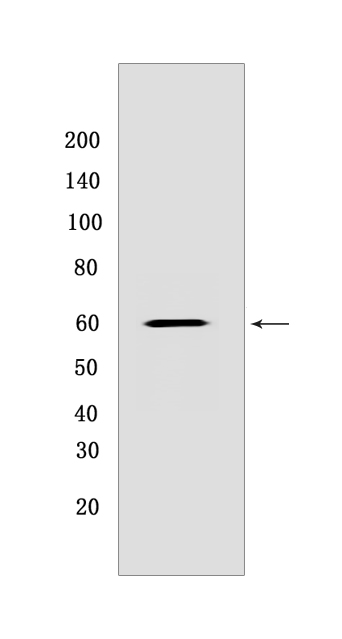Cytochrome P450 4A (CYP4A11) Rabbit mAb[00K8]Cat NO.: A80230
Western blot(SDS PAGE) analysis of extracts from Mouse liver tissue lysate.Using Cytochrome P450 4A (CYP4A11) Rabbit mAb IgG [00K8] at dilution of 1:1000 incubated at 4℃ over night.
Product information
Protein names :CYP4A11,CYP4A2,CP4AB_HUMAN,Cytochrome P450 4A11
UniProtID :Q02928
MASS(da) :59,348
MW(kDa) :59KDa
Form :Liquid
Purification :Protein A purification
Host :Rabbit
Isotype :IgG
sensitivity :Endogenous
Reactivity :Human,Mouse,Rat
- ApplicationDilution
- 免疫印迹(WB)1:1000-2000,
- 免疫组化(IHC)1:100
- The optimal dilutions should be determined by the end user
Specificity :Antibody is produced by immunizing animals with a synthetic peptide of human Cytochrome P450 4A (CYP4A11).
Storage :Antibody store in 10 mM PBS, 0.5mg/ml BSA, 50% glycerol. Shipped at 4°C. Store at-20°C or -80°C. Products are valid for one natural year of receipt.Avoid repeated freeze / thaw cycles.
WB Positive detected :Mouse liver tissue lysate
Function : A cytochrome P450 monooxygenase involved in the metabolism of fatty acids and their oxygenated derivatives (oxylipins) (PubMed:7679927, PubMed:1739747, PubMed:8914854, PubMed:10553002, PubMed:10660572, PubMed:15611369). Mechanistically, uses molecular oxygen inserting one oxygen atom into a substrate, and reducing the second into a water molecule, with two electrons provided by NADPH via cytochrome P450 reductase (CPR,NADPH-ferrihemoprotein reductase) (PubMed:7679927, PubMed:1739747, PubMed:8914854, PubMed:10553002, PubMed:10660572, PubMed:15611369). Catalyzes predominantly the oxidation of the terminal carbon (omega-oxidation) of saturated and unsaturated fatty acids, the catalytic efficiency decreasing in the following order: dodecanoic > tetradecanoic > (9Z)-octadecenoic > (9Z,12Z)-octadecadienoic > hexadecanoic acid (PubMed:10553002, PubMed:10660572). Acts as a major omega-hydroxylase for dodecanoic (lauric) acid in liver (PubMed:7679927, PubMed:1739747, PubMed:8914854, PubMed:15611369). Participates in omega-hydroxylation of (5Z,8Z,11Z,14Z)-eicosatetraenoic acid (arachidonate) to 20-hydroxyeicosatetraenoic acid (20-HETE), a signaling molecule acting both as vasoconstrictive and natriuretic with overall effect on arterial blood pressure (PubMed:10620324, PubMed:10660572, PubMed:15611369). Can also catalyze the oxidation of the penultimate carbon (omega-1 oxidation) of fatty acids with lower efficiency (PubMed:7679927). May contribute to the degradation of saturated very long-chain fatty acids (VLCFAs) such as docosanoic acid, by catalyzing successive omega-oxidations to the corresponding dicarboxylic acid, thereby initiating chain shortening (PubMed:18182499). Omega-hydroxylates (9R,10S)-epoxy-octadecanoate stereoisomer (PubMed:15145985). Plays a minor role in omega-oxidation of long-chain 3-hydroxy fatty acids (PubMed:18065749). Has little activity toward prostaglandins A1 and E1 (PubMed:7679927)..
Tissue specificity :Expressed in liver (PubMed:7679927). Expressed in S2 and S3 segments of proximal tubules in cortex and outer medulla of kidney (PubMed:7679927, PubMed:10660572)..
Subcellular locationi :Endoplasmic reticulum membrane,Peripheral membrane protein. Microsome membrane,Peripheral membrane protein.
IMPORTANT: For western blots, incubate membrane with diluted primary antibody in 1% w/v BSA, 1X TBST at 4°C overnight.


